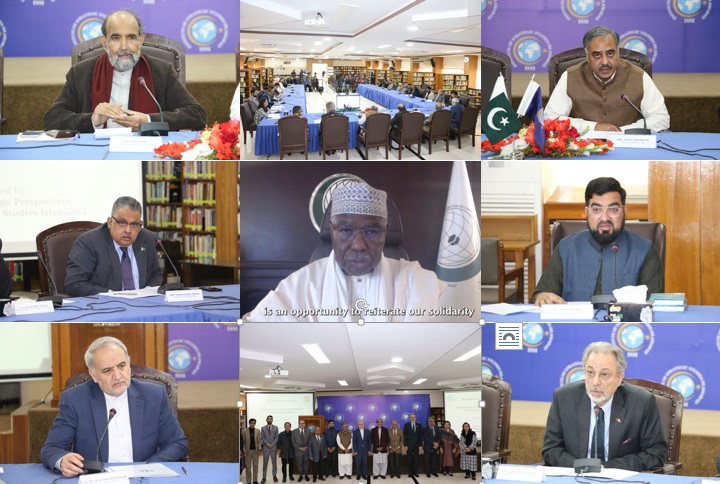Press Release
ISSI hosts Roundtable on the “Importance of Global Solidarity to Combat Islamophobia”
March 15, 2024

To commemorate the International Day to Combat Islamophobia, the Centre for Strategic Perspectives (CSP) at the Institute of Strategic Studies Islamabad (ISSI), hosted a Roundtable Discussion titled, “Importance of Global Solidarity to Combat Islamophobia”, bringing to the fore a global dialogue aimed at addressing the prejudices, intolerance, violence and injustices faced by Muslims worldwide. Dr. Qibla Ayaz, Chairman of the Council of the Islamic Ideology (CII), was chief guest; Ambassadors of Iran and Turkiye and noted academic and senior Foreign Office official joined as panellists.
In her introductory remarks, Dr. Neelum Nigar, Director CSP thanked the esteemed panellists and other participants and emphasized the importance of combating Islamophobia in contemporary times, which is marred by multiple global conflicts and issues.
DG ISSI Ambassador Sohail Mahmood, in his welcoming remarks, highlighted the journey since the March 2019 Christchurch terrorist attacks in New Zealand, highlighting the pivotal moments and global actions, including Pakistan’s leading role in the OIC and the UN General Assembly, culminating in the designation of March 15 as the ‘International Day to Combat Islamophobia.’ While tracing the evolution and myriad manifestations of Islamophobia in recent decades, he emphasized that Islamophobia was not just prevalent in some Western countries but in non-Western parts of the world as well, including in Pakistan’s neighbourhood where it was growing in the wake of the ‘Hindutva’ ideology. Noting that the world was experiencing extreme levels of tumult, he stressed that this was the time to build bridges, not to accentuate religious or cultural fault-lines or create further divisions. People of goodwill in all faiths should come forward and play their part in forging greater mutual respect, understanding, and inter-faith harmony, he concluded.
A special video message by the Honourable Secretary General of the Organisation of Islamic Cooperation (OIC) His Excellency Hissein Brahim Taha for the occasion was shared. The Secretary General emphasized the urgent need to combat and address the widespread prejudice and discrimination against Muslims globally and the importance of fostering a culture of tolerance, respect, and mutual understanding across different faiths and communities. Moreover, he called for international solidarity, legal measures against hate speech and discrimination, and educational initiatives to dispel myths and misconceptions about Islam and its followers.
Dr. Muhammad Israr Madani from the Islamic Research Council of Religious Affairs, provided a scholarly exposition on the multifaceted nature of Islamophobia, tracing its historical roots and present-day manifestations. His analytical insights into the contributing factors of Islamophobia, from media misrepresentation to the socio-political dynamics in Western countries, offered a comprehensive overview of the complexities involved. Dr. Madani’s emphasis on strategic engagement, media literacy, and educational reforms proposed a constructive framework for counteracting Islamophobic narratives.
Ambassador Rizwan Saeed Sheikh, Additional Secretary Ministry of Foreign Affairs (MOFA), delved into the political and legal dimensions of Islamophobia, advocating for a balanced approach between freedom of expression and respect for religious sentiments. His call for utilizing international human rights frameworks as a common ground for dialogue and action resonated with the audience, highlighting the significance of diplomacy and legal recourse in combating Islamophobia.
H.E. Dr. Reza Amiri Moghadam, Ambassador of the Islamic Republic of Iran, enriched the discussion by contextualizing Islamophobia within the broader historical and geopolitical narratives. His critique of Islamophobia as a tool for political manipulation and his call for unity among Muslim nations underscored the importance of solidarity and collective identity in overcoming adversities.
H.E. Dr. Mehmet Paçaci, Ambassador of Türkiye to Pakistan, pointed to the alarming rise of Islamophobia globally, especially in the Western and certain non-Western countries including India. His discourse on the political misuse of Islamophobia and the urgent need for international accountability and cooperation offered a compelling call to action for both Muslim and non-Muslim countries to address this pressing issue.
Chief Guest Dr. Qibla Ayaz delivered an illuminating address, providing deep historical insight into Islamophobia, identifying its roots and evolution over the centuries. Dr. Ayaz recommended fostering deeper understanding of Western cultures, promoting inter-faith dialogues, and the strategic use of media and academia to combat Islamophobia highlighting a path toward mutual respect and understanding.
Specifically, he stressed the importance of ‘working in the West’ on the one hand, and developing better understanding of the West within Muslim societies on the other hand. Dr. Qibla Ayaz also underlined the need for “retrospection” – noting that extremist actions of individual Muslims or disrespect for the rights of minorities in Muslim countries would neither result in better image nor help forge mutual understanding. In essence, he said he saw a ‘ray of hope’ and that, despite prevalent negativity and formidable challenges, collective action could help bring about positive change.
Remarks by the esteemed speakers were followed by an interactive discussion session in which all participants took part enthusiastically. The discussion emphasized the importance of youth engagement, global solidarity, informed dialogue, and proactive measures to address Islamophobia.
In the end, Ambassador Khalid Mahmood, Chairman BOG ISSI presented the honourable participants of the discussion with ISSI mementos, which was followed by a group photograph.












